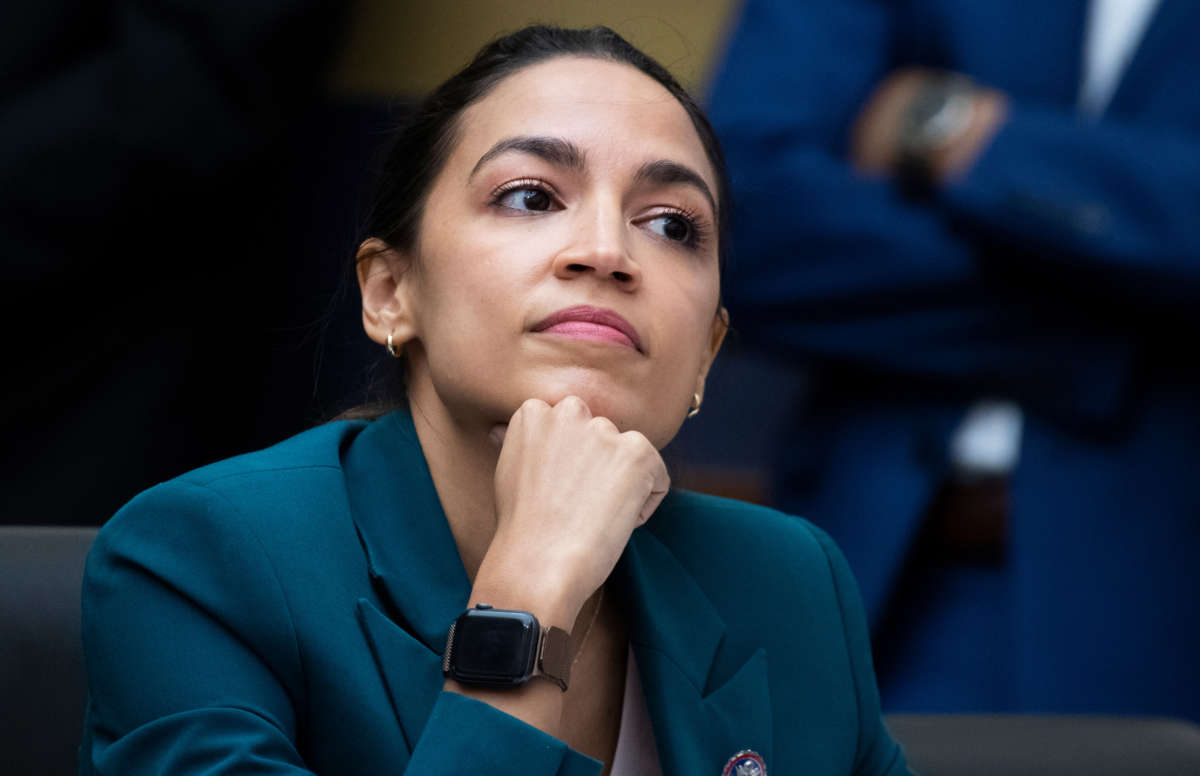Rep. Alexandria Ocasio-Cortez (D-New York) has condemned conservative Democrats for fighting to cut social programs in the reconciliation bill while preserving tax cuts for climate-denying industries and corporations.
On Thursday, Axios revealed that Sen. Joe Manchin (D-West Virginia) has been demanding that progressives choose only one of three family-related proposals to include in the Build Back Better Bill: either the extended child tax credit, paid family leave or funding for child care.
“Ah yes, the Conservative Democrat position: ‘You can either feed your kid, recover from your c-section, or have childcare so you can go to work — but not all three. All three makes you entitled and lazy,’” wrote Ocasio-Cortez on Twitter. “But fossil fuel money, keeping Rx prices high, and not taxing Wall Street are ‘non-negotiable.’”
Rep. Jamaal Bowman (D-New York) also chimed in, writing: “Responsible governing isn’t about pitting women, children, and families against each other. We have the resources to uplift everyone and leave no one behind. It’s absurd to say that we don’t.”
In a video on Thursday, Bowman noted that as an educator, much of his career has been spent working with children and families, many of whom were low-income. “I cannot understand for the life of me how we are compromising on issues like lifting 50 percent of children out of poverty, like universal child care and like paid family leave,” he said, pointing out that these policies impact marginalized communities the most. “How are we going to compromise on lifting 50 percent of children out of poverty?”
“Stop with the nonsense,” Bowman continued, condemning tax shelters and tax codes that are skewed towards the wealthy.
On Wednesday, Sen. Bernie Sanders (I-Vermont) criticized Manchin for being vague and purposefully opaque about his demands for the reconciliation bill. Though Manchin has said that he will only accept a reconciliation bill that’s less than half of the bill’s current size, he hasn’t specified which programs he would choose to cut, even to fellow senators.
“Senator Manchin, as I understand it, talked about, today, about not wanting to see our country become an ‘entitlement society.’ I am not exactly sure what he means by that,” Sanders remarked in the Capitol, adding that it’s “long overdue” for Manchin to tell Democrats and the public exactly what he wants to negotiate out of the bill.
https://t.co/9OUws8XYYG pic.twitter.com/jMmXfYQHv5
— People for Bernie (@People4Bernie) October 7, 2021
Instead, Manchin has imposed the responsibility of cutting the bill onto progressives — the only ones in Congress fighting to preserve the $3.5 trillion bill in its entirety, while conservative Democrats, Republicans and massive corporate lobbying efforts have relentlessly campaigned to make cuts.
By forcing the responsibility onto progressives to cut popular policies, Manchin is also shifting the blame. Sanders has previously implied that conservative Democrats may be keeping their demands for the reconciliation bill vague so they can avoid the potential negative press that would come with publicly sharing which programs they would cut.
Instead, lawmakers like Manchin attack the bill’s price tag, borrowing from the longtime Republican and right-wing libertarian strategy to attack any form of government spending as justification to cut social programs. Corporate media enables this strategy by emphasizing the price tag — without mentioning details like new research that suggests Manchin’s slashes at the topline of the bill could kill 2 million jobs.
In response, progressives have been shifting the focus away from the price tag and putting the $3.5 trillion — which will be spent over the course of 10 years — into context. Though Manchin is fighting hard to shrink the Build Back Better Act, he has approved about $9.1 trillion to the Pentagon over the last 10 years, progressives pointed out last week. Meanwhile, Sanders has broadcasted that, in the context of economic projections over the next 10 years, the bill would only be about 1.2 percent of the nation’s Gross Domestic Product (GDP).
We have 9 days to raise $50,000 — we’re counting on your support!
For those who care about justice, liberation and even the very survival of our species, we must remember our power to take action.
We won’t pretend it’s the only thing you can or should do, but one small step is to pitch in to support Truthout — as one of the last remaining truly independent, nonprofit, reader-funded news platforms, your gift will help keep the facts flowing freely.
